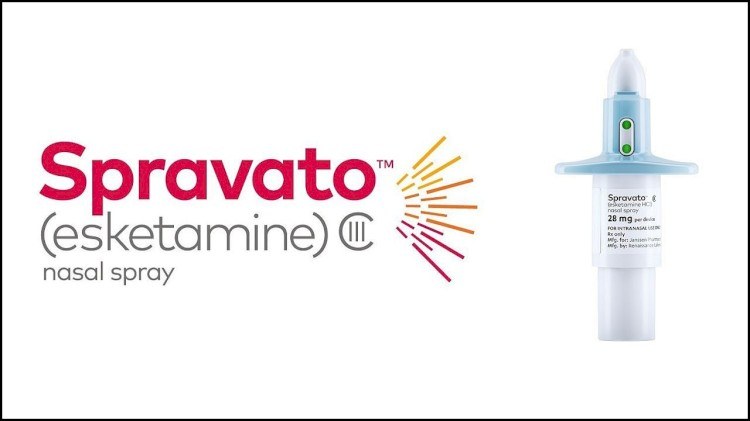
UK-based Health Technology Assessment (HTA) Agency, the National Institute for Health and Care Excellence (NICE), decided last week not to recommend Spravato (esketamine) for integration into the UK health system in a draft guideline report.
NICE rejected Spravato – a nasal spray developed by pharma giant, Johnson and Johnson (J&J) – as a part of a treatment regimen with selective serotonin reuptake inhibitors (SSRIs) or selective norepinephrine reuptake inhibitors (SNRIs) for depression patients that failed to respond to two or more antidepressants. Individuals that fall into this category of treatment failures are diagnosed with treatment-resistant depression (TRD).
The Ketamine Treatment Paradigm
The active ingredient in Spravato – esketamine hydrochloride – is the S-(+) enantiomer of ketamine. Esketamine exhibits both anesthetic and dissociative properties.1 The treatment regimen – aimed at treating TRD – takes place over two phases in a clinical setting under the direct supervision of a trained health care provider. There are two distinct phases of the treatment: The induction phase – week one to four – in which the patient receives treatment twice per week at either a 56 mg or 84 mg dose, and the maintenance phase – weeks five to eight – whereby administration frequency is reduced to once weekly. Clinicians may extend the maintenance phase if necessary.
NICE’s Appraisal and Reasons for Rejecting Spravato
NICE expressed uncertainties over Spravato’s clinical and cost-effectiveness. Data from clinical trials demonstrated that the drug given in combination with an oral antidepressant might be more effective at alleviating the symptoms of depression than a placebo and an oral antidepressant given together. However, NICE claimed that the advantage Spravato may have over other treatments – such as different oral antidepressants with antipsychotics or adjunctive lithium therapy – is uncertain because these treatments have not been compared directly. The agency commented further that available data did not include psychological therapies, which contributed to the decision.
Also, NICE indicated skepticism about the effect of stopping esketamine treatment. It’s unclear if any improvements in symptoms will be sustained following a course of treatment and whether this would enhance the patient’s quality of life.
The Role of an HTA Body in the UK
This decision by NICE is in contrast to the regulatory success J&J experienced in 2019 with Spravato receiving regulatory approval on both sides of the Atlantic from the European Medicine Agency (EMA) and the US Food and Drug Administration (FDA). While these regulatory bodies focus primarily on the safety and efficacy of new medicines, HTA bodies such as NICE:
- determine reimbursement status
- provide information on the benefits and harms of new treatments compared to available treatment options
- support the price negotiation process
The jurisdiction of HTA bodies is confined to a regional or national level.
In a nutshell, NICE advises the National Health Service (NHS) in the UK on which drugs to buy and integrate into the healthcare system.
Implications of the UK Rejecting Spravato
NICE’s decision represents a substantial hurdle for Spravato’s acceptance as a viable treatment for TRD and ultimately depression as a whole. The US-based Institute of Clinical and Economic Reform (ICER) also raised the issue of cost-effectiveness, citing that,
The direct treatment costs for esketamine are ten times higher than that of ketamine in the first year, even when considering increased administration costs associated with providing ketamine intravenously.
According to Pharmatimes.com, Janssen’s (a subsidiary of J&J) Director of Health Economics, Market Access & Reimbursement (HEMAR), Jennifer Lee, called NICE’s negative appraisal “extremely disappointing,” as said it is,
a decision which may potentially deny patients living with treatment-resistant major depressive disorder access to a much-needed new treatment option.
Ms. Lee continued,
It is evident from this initial draft guidance that current NICE technology appraisal processes are not fit for purpose in terms of evaluating innovative technologies for complex mental health conditions, an area that is already under-researched and underfunded. This decision further reinforces the need for reform through the NICE Methods Review to allow a new generation of innovative treatments to reach patients.
What Happens Next?
Drug sponsors – J&J in this case- may appeal NICE’s decision within 15 working days from the day the final draft guidance based on the following grounds:
Ground One: The institute has failed to act fairly, and in accordance with the appraisal procedures set out in the Institute’s Guide to the Technology Appraisal Process
Ground Two: The Institute has formulated guidance, which cannot reasonably be justified in the light of evidence submitted.
Ground three: The Institute has exceeded its powers.
However, the sponsor must provide novel evidence to support their claim, as the NICE committee refuses to reconsider data presented in the original appraisal.
After suffering with major depressive disorder my entire life i am now 70 years old and had long ago given up hope of getting any lasting relief. I felt like I had nothing to lose by trying ketamine Iv. I think I now feel like human beings are supposed to feel but I wouldn’t know since I have always been depressed. I go back for boosters every 12 weeks. Mot everyone can afford it but hope ins companies soon cover it. For the first time ever, I do not feel that my only option is suicide.
Awesome
Be interesting to see who tries the ketamine metabolite:
https://www.nature.com/articles/s41386-019-0443-3